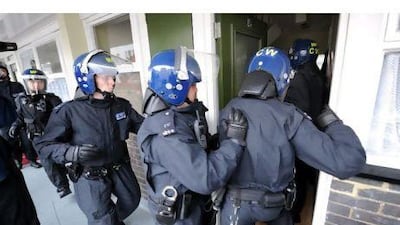LONDON // As the British parliament yesterday launched an inquiry into the worst rioting in almost three decades, social commentators pointed the finger at factors ranging from poor parenting, to government cuts to rampant consumerism.
In pictures: London riots
Photos from the north London area of Tottenham during the riots.
Images of youths rampaging on the streets of British cities this week shocked the nation, provoking soul-searching into why and how such lawlessness erupted with seeming impunity. The violence provided stark contrast to the shiny and modern image that Britain hoped to project as it prepares to host the Olympic Games next year.
David Cameron, the Conservative prime minister, invoked a lack of family values during an emergency parliamentary debate yesterday. Some of the looters seen on the streets this week were as young as 11 and police chiefs were forced to plead with parents to keep their children at home.
"This is not about poverty, it's about culture. A culture that glorifies violence, shows disrespect to authority, and says everything about rights but nothing about responsibilities," he said. "In too many cases, the parents of these children, if they are still around, don't care where their children are or who they are with, let alone what they are doing."
While politicians of all persuasions were united in blaming plain criminality for the violence and looting, deeper questions were being asked about an underclass of youths that until now has been largely ignored by authorities.
"It's clear that youths from affluent, middle-class households were not out on the streets trashing shops. So to that extent, it's about deprivation and inequality," said Chris Hamnett, a professor specialising in social polarisation, gentrification and housing at King's College, London. "But what we saw was looting for fun and profit, not political protest."
Since Saturday night, police have arrested more than 1,200 people across the country in connection with the violence, disorder and looting. The lawlessness dominated British headlines in a week that also saw financial turmoil and steep losses in global markets, including the London Stock Exchange.
To tackle deficits, the government is forging ahead with an austerity programme of £111 billion (Dh660 billion) in public spending cuts by 2016.
But calls to scrap a planned 20 per cent reduction in the police budget are now widespread among opposition politicians and the wider public.
The economic recession has hit young Britons hard. One million people aged between 16 and 24 are officially unemployed and commentators have spoken of a "lost generation".
But deep-seated frustration spilled over this week not into demands for jobs or opportunities, but for the trappings of a consumer society previously denied to them, said Alex Hiller, a marketing professor at Nottingham Business School.
Looters were seen this week breaking into shops, stealing televisions, trainers and mobile phones before trashing and burning them.
"Consumerism promotes the idea of competitive individualism and the value of what you have, rather than what you are," said Mr Hiller. "Yes, people must be punished for what they did this week but questions have to be asked about a culture in which people are told to equate happiness with what products they have."
Areas such as Tottenham, where the rioting started last Saturday night, also have some of the highest levels of income inequality in the country. Pockets of gentrification and multimillion-pound homes lie near "sink" estates of public housing where welfare dependency and broken families are the norm.
But some people pointed to a wider breakdown in social values exemplified by recent scandals over rich politicians making false claims for expenses and investment bankers escaping sanction for creating global financial turmoil.
"I've lived in this country for more than 20 years and there's just no respect anymore," said Mustafa, a Turkish Cypriot in Tottenham who did not want to reveal his surname.
"No wonder people get angry when they see the bankers and the politicians getting away with whatever they want." But the government's focus was on gang leaders, rather than white-collar criminals.
Mr Cameron said gangs were at the heart of this week's protests and that the government would be looking to the US to learn how best to combat them.
Graham Stringer, a Labour MP for Blackley and Broughton on the outskirts of Manchester, noted this week that as many as 48 gang leaders operated in the city, but the fight against them had been weakened because police resources had been switched to fighting Muslim extremists.

